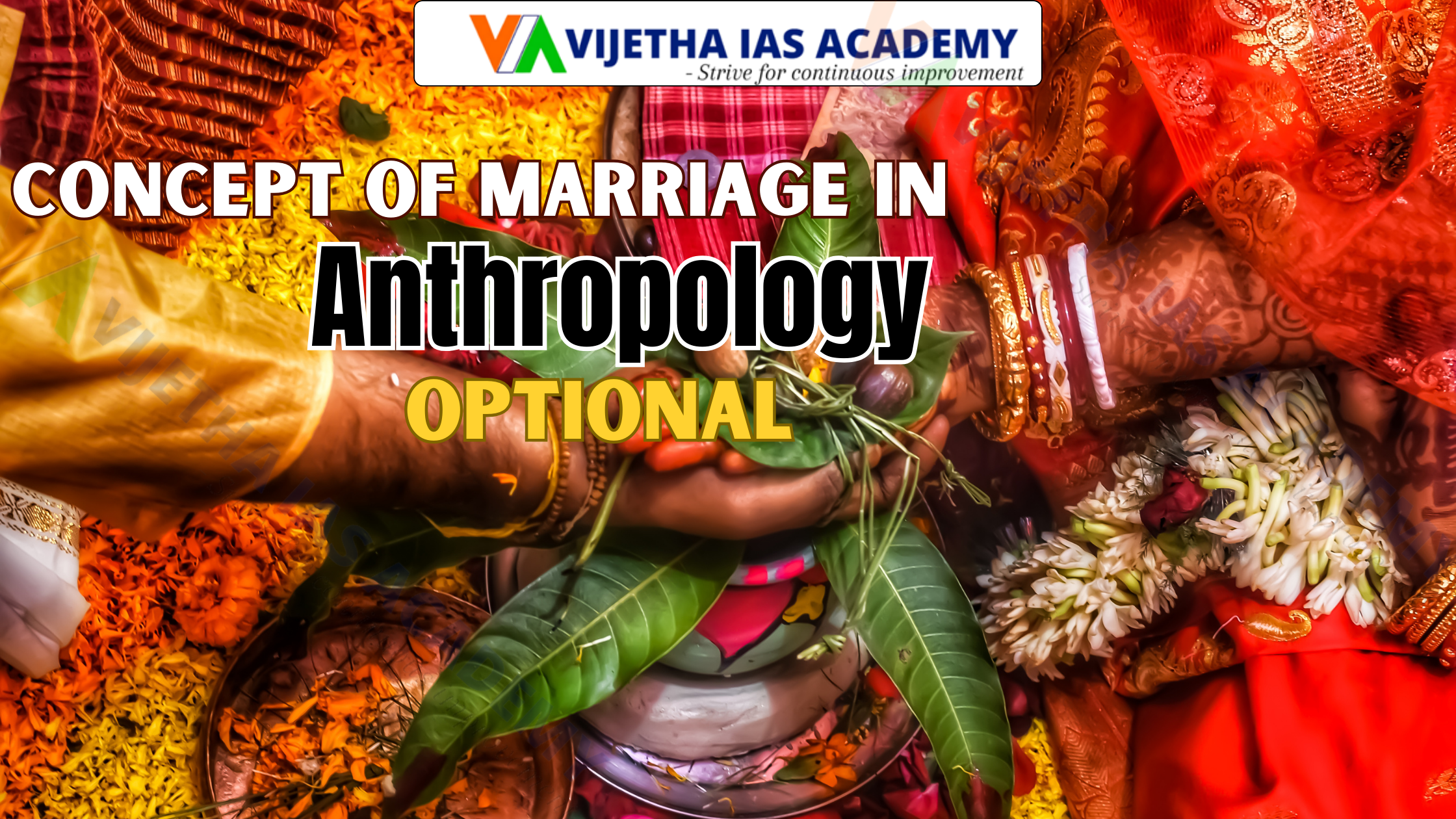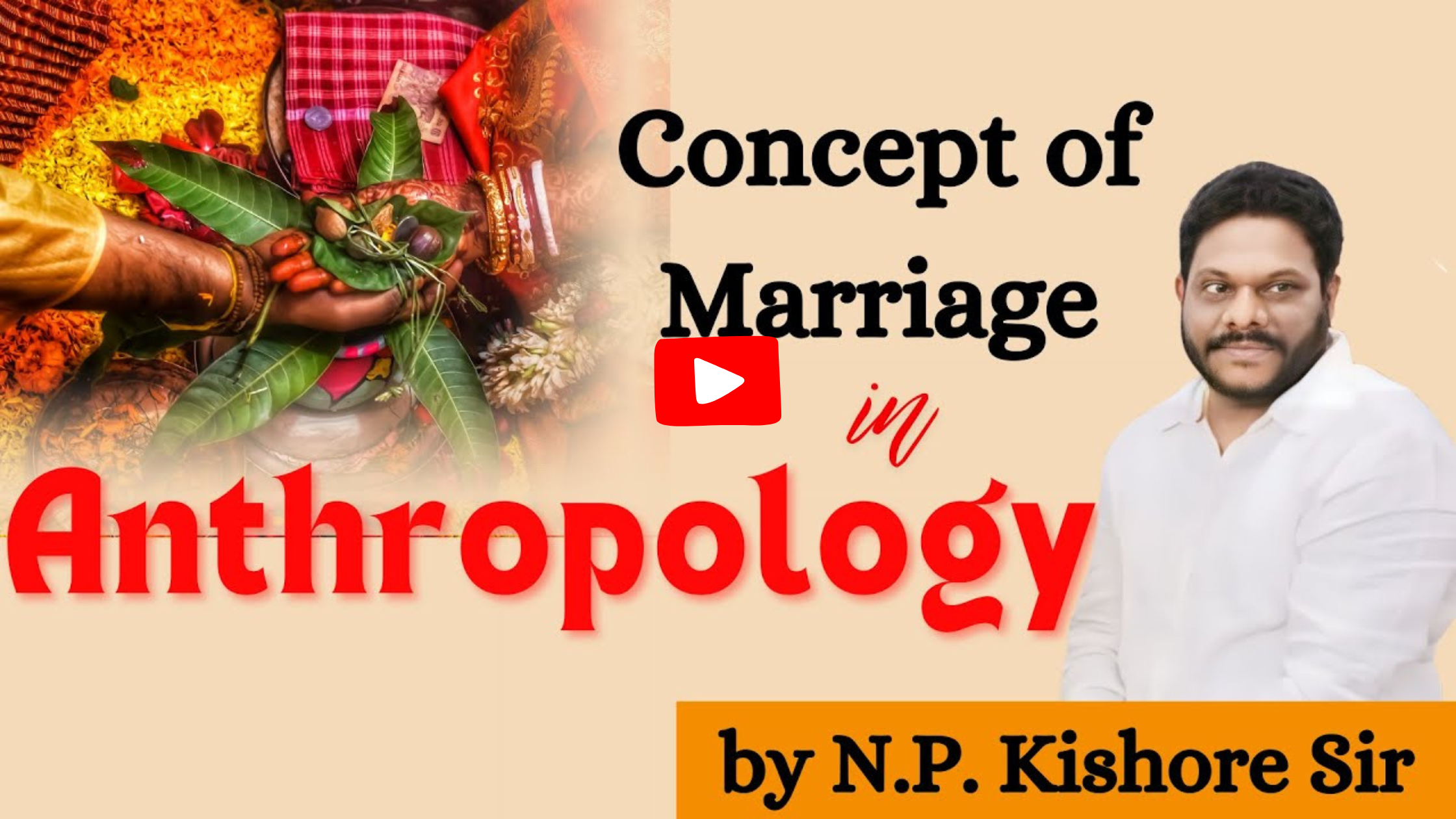
Concept of Marriage in Anthropology Optional by N.P Kishore Sir
When preparing for the UPSC exam, understanding the Concept of Marriage in Anthropology Optional within the Anthropology optional subject is crucial for gaining comprehensive knowledge. N.P. Kishore Sir, a distinguished expert in Anthropology, offers profound insights into this fundamental concept. This blog delves into the significance of the concept of marriage in Anthropology, highlighting how it fits into the broader framework of Anthropology optional preparation with guidance from N.P. Kishore Sir and the resources available at Vijetha IAS Academy.
For more information about Concept of Marriage in Anthropology Optional topic Click on My youtube Link: https://youtu.be/baMq5RW9M6w?si=d1GODHWLAKLKscrB
Understanding Concept of Marriage in Anthropology Optional
Concept of Marriage in Anthropology Optional is a key subject in anthropology, representing a social institution that binds individuals into familial structures. In Anthropology, the study of marriage encompasses its various forms, functions, and the cultural contexts in which it operates. This concept is not only central to understanding human societies but also pivotal for those preparing for the UPSC with Anthropology as their optional subject.
Theoretical Perspectives on Concept of Marriage in Anthropology Optional
N.P. Kishore Sir emphasizes several theoretical perspectives on marriage, which are crucial for a nuanced understanding of the concept. These include:
-
Structural Functionalism: This theory posits that marriage functions to maintain social stability and order by providing a structure for procreation and socialization of children.
-
Conflict Theory: According to this perspective, marriage can be viewed as a social arrangement that may perpetuate inequality and power dynamics between genders.
-
Symbolic Interactionism: This approach focuses on the subjective experiences and meanings individuals attach to marriage, highlighting the role of personal interactions in shaping marital relationships.
Types and Forms of Concept of Marriage in Anthropology Optional
N.P. Kishore Sir covers various types and forms of marriage that students must be familiar with for the UPSC examination:
- Monogamy: A marriage system where one person is married to one partner at a time. This is prevalent in many Western societies.
- Polygamy: This includes polygyny (one man with multiple wives) and polyandry (one woman with multiple husbands). Polygamy is practiced in various cultures worldwide.
- Group Marriage: A less common form where multiple individuals of both genders form a collective marital unit.
Understanding these forms helps students grasp the diverse ways in which marriage is organized and regulated across different cultures.
Marriage and Kinship
In anthropology, marriage is closely linked to the study of kinship, which explores family relationships and descent patterns. Marriage plays a significant role in forming kinship ties, affecting inheritance, lineage, and social affiliations. N.P. Kishore Sir's approach highlights how marriage systems influence and are influenced by kinship structures, providing a comprehensive view of their interconnections.
Concept of Marriage in Anthropology Optional and Social Change
The concept of marriage is not static; it evolves with social changes. Factors such as globalization, legal reforms, and cultural shifts impact marital norms and practices. N.P. Kishore Sir discusses how these changes reflect broader societal transformations and how they are relevant for the Anthropology optional syllabus.
Why Study Concept of Marriage in Anthropology Optional?
- Foundational Knowledge: Understanding marriage provides a foundation for analyzing other social institutions and practices.
- Cultural Insights: It offers insights into the cultural diversity and social dynamics of various societies.
- UPSC Relevance: Marriage is a critical topic in the Anthropology optional syllabus, making it essential for scoring well in the exam.
Resources Concept of Marriage in Anthropology Optional at Vijetha IAS Academy
For those preparing for the UPSC exam with Anthropology as their optional subject, Vijetha IAS Academy offers valuable resources and guidance:
- Expert Guidance: With experienced faculty like N.P. Kishore Sir, Vijetha IAS Academy provides detailed and practical insights into complex topics such as marriage in Anthropology.
- Comprehensive Study Material: The academy offers well-structured study materials that cover the concept of marriage extensively.
- Personalized Mentorship: Students receive personalized attention to address their individual learning needs and exam preparation strategies.
Explore the specialized Anthropology courses offered at Vijetha IAS Academy to gain a deeper understanding of marriage and other essential concepts.
For additional reading and study, refer to the following internal links:
- Marriage in Anthropological Theories
- Kinship and Marriage in Different Cultures
- The Role of Marriage in Social Change
Conclusion
The concept of marriage in anthropology, as taught by N.P Kishore Sir, is a cornerstone for understanding human societies and their complexities. For UPSC Anthropology Optional aspirants, mastering this topic through expert guidance and structured study can significantly enhance your preparation and performance.
For more information on Anthropology Optional coaching and resources, visit Vijetha IAS Academy and benefit from their comprehensive mentorship programs.

